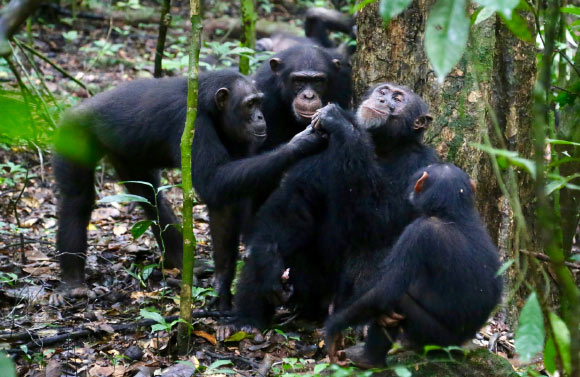Why share when access to benefits is uncertain is crucial to our understanding of the evolution of cooperation in human societies. In a study published in the Proceedings of the Royal Society B, Dr. Catherine Crockford of the Max Planck Institute for Evolutionary Anthropology and colleagues investigated some of the different human sharing hypotheses and potential mechanisms, in one of our closest living relatives, chimpanzees (Pan troglodytes).
“Resource acquisition and sharing are thought to play a central role in human collaborative foraging, the evolution of human sociality, and our propensity to cooperate with kin and non-kin,” Dr. Crockford and co-authors said.
“Sharing of resources is a universal human trait, unusual among animals in that it extends beyond kin relationships, or social networks of reciprocating partners.”
“While ‘kin selection’ is proposed to explain food exchange between related individuals, the evolutionary mechanisms favoring exchanges between non-kin, in which there is no immediate gain to actors, are highly debated.”
“The ‘tolerated theft’ or ‘sharing under pressure’ hypotheses propose that possessors share food to decrease energy expenditure-related costs created by beggars, and that the costs of defending a resource, or resource holding potential should predict asymmetries in food distribution patterns.”
“The ‘costly signaling’ hypothesis posits sharing as an honest signal advertising the donor’s phenotypic quality, and is usually applied to male possessors.”
“The ‘reciprocal altruism’ hypothesis states that food is exchanged for delayed benefits, either as food or as another ‘currency,’ such as social support, grooming, or mating opportunities.”
“Sharing can also serve as trade-based reciprocity for labor as posited in the ‘cooperative acquisition’ hypothesis.”
For the study, the scientists observed natural food sharing behavior of wild West African chimpanzees (Pan troglodytes verus) in the Tai National Park, Cote d’Ivoire, between October 2013-May 2014 and September 2014-May 2015.
They found that chimpanzees are very selective in who they share desirable food items, like meat, honey or large fruits, with.
The animals were more likely to share food with their friends. Neither high dominance status nor harassment by beggars influenced their decision.
This complements results from another study by the same team that examined meat sharing after group hunting of monkeys. There they found that chimpanzees in possession of meat after successful hunts were likely to reward other hunters by sharing with them.
“Collectively our research shows that the chimpanzees decide when to share food based on the likelihood that this favor will be returned in the future,” said study first author Dr. Liran Samuni, also form the Max Planck Institute for Evolutionary Anthropology.
“Or, in case of sharing after group hunts, sharing of meat is returning the favor for helping out.”
“Previous studies in another subspecies of chimpanzees have suggested that food sharing in chimpanzees mainly occurs because of harassment pressure from beggars.”
“This was not the case for the Tai chimpanzees,” Dr. Crockford said.
Additionally, the team collected urine samples from chimpanzees after hunting and food sharing events and measured the hormone oxytocin.
“We know that oxytocin plays a strong role in lactation, which you could look at as an example of food sharing between mother and infant, and is generally involved in social behavior and bonding,” Dr. Samuni said.
The study authors found high levels of oxytocin after chimpanzees shared meat and other valued foods, and after chimpanzee participated in hunting with others.
“That we found higher oxytocin levels after both hunting and sharing adds to the idea that oxytocin is a key hormone involved in cooperation in general,” Dr. Samuni said.
The researchers conclude that like humans, Tai chimpanzee sharing is selective, and that friends and others that helped acquiring the food benefit more.
“Emotional connection, as is obvious amongst friends, likely played a crucial role in the evolution of human cooperation,” they said.
_____
L. Samuni et al. Social bonds facilitate cooperative resource sharing in wild chimpanzees. Proc. R. Soc. B 285: 20181643; doi: 10.1098/rspb.2018.1643








